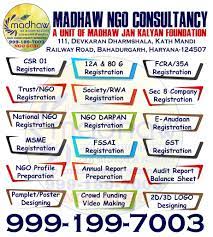NGO Registration
- NGO Registration
- Difference in Company, Society and Trust
- How to Start NGO – Form, Register and Run NGO
- Why to Register NGO
- How to run and manage NGO?
- Society Registration
- Society Registration Process and Procedure
- Name Change Process for Society
- How to Register NGO
- Societies Registration Act, 1860
- Public Charitable trust
- Registration Process of Public Charitable Trust
- After Registering the Public Charitable Trust
- Section 8 Non Profit Company Registration
NGO Resources
- NGO Resources
- NGO & Government of India
- NGO Partnership Registration
- Relations of NGOs with Business and Commerce
- Public Grievances Resolution related to Government
- Social Calendar
- NGO Management
- NGO Support
- What is NGO
- Voluntary Organisations and Volunteerism
- NGOs : Classification, Definitions, Typologies and Networks
- Understanding NGOs
- Can any Government Employee or Officer be the member of NGO?
- Income Exemption u/s 35AC Revoked
- Aims, Objectives & Programmes for NGO
NGO Funding & Grants
- NGO Funding
- Fundraising
- Funding and Grant Schemes
- Govt Schemes
- How to raise Funds for NGO
- Project Proposal Process
- Fundraising Ideas and Concepts
- Funding Agencies
- CSR Funding Empanelment by National CSR Hub
- CSR Funds through Corporate
- CSR Policy, Rules, Regulations and Guidelines of Government
- Government Funding Ministries
- International Funding Agencies
- Google for Nonprofits
- Fellowship
- CSR Funding
- Fund Raising
- Government Funding
- Grant Proposal for NGO Writing Preparation Process
- Project Proposals
Indian Non-Profits
- Andaman Nicobar
- Arunachal Pradesh
- Andhra Pradesh
- Assam
- Bihar
- Chandigarh
- Chhattisgarh
- Dadra Nagar Haveli
- Daman and Diu
- Delhi
- Goa
- Gujarat
- Haryana
- Himachal Pradesh
- Jammu Kashmir
- Jharkhand
- Ladakh
- Karnataka
- Kerala
- Lakshadweep
- Madhya Pradesh
- Maharashtra
- Manipur
- Meghalaya
- Mizoram
- Mumbai
- Nagaland
- Orissa
- Pondicherry
- Punjab
- Rajasthan
- Sikkim
- Tamil Nadu
- Telangana
- Tripura
- Uttar Pradesh
- Uttarakhand
- West Bengal
Right To Information – RTI

What is RTI (Right To Information)
How to Use RTI
- What is RTI?
- If RTI is a fundamental right, then why do we need an Act to give us this right?
- When did RTI Act come into force?
- What rights are available under RTI Act 2005?
- Who is covered under RTI?
- What is “substantially financed”?
- Are Private bodies covered under the RTI Act?
- Isn’t Official Secrets Act 1923 an obstacle to the implementation of RTI Act?
- Can the PIO refuse to give me information?
- Does the Act provide for partial disclosure?
- Can access be denied to file notings?
- How do I locate the full Act?
- Who will give me information?
- Where do I submit application?
- Is there any fee? How do I deposit that?
- What should I do if the PIO or the concerned Department does not accept my application?
- Is there an application form for seeking information?
- How can I apply for information?
- How can I deposit my application fee?
- Can I submit my application only with the PIO?
- Where can I locate the concerned PIO?
- What if I can not locate my PIO or APIO?
- Do I have to personally go to deposit my application?
- Is there a time limit to receiving information?
- Do I have to give reasons why I want a particular information?
- Can the PIO refuse to accept my RTI application?
- There have been many good laws in this country but none of those laws worked. Why do you think this law would work?
- Has any penalty been imposed so far?
- Does the Applicant get the amount fined to the PIO?
- What can I do if I do not receive information?
- Who is a First Appellate authority?
- Is there a form for the first appeal?
- Do I have to pay a fee for the first appeal?
- In how many days can I file my first appeal?
- What if I do not receive the information after the first appeal process?
- What is a second appeal?
- Is there a form for the second appeal?
- Do I have to pay a fee for the second appeal?
- In how many days can I file my second appeal?
- How does this law help me in getting my work done
- What should I do after getting information?
- Have people been victimized who used RTI and exposed corruption?
- Then why should I use RTI?
- What are these strategies?
- Can’t people blackmail government servants by obtaining information?
- Won’t Government get flooded with RTI applications and won’t it jam government machinery?
- Won’t it require huge amount of resources to implement RTI Act?
- But often people file applications to settle personal scores etc?
- How to avoid people from filing frivolous applications?
- File notings should not be made public as that would prevent honest officers from rendering honest advice?
- Government records are not in proper shape. How could RTI be implemented?
- Applications seeking voluminous information should be rejected?
What is RTI?
RTI stands for Right to Information. Right to Information is a part of fundamental rights under Article 19(1) of the Constitution. Article 19 (1) says that every citizen has freedom of speech and expression. As early, the Supreme Court said that people cannot speak or express themselves unless they know. Therefore, right to information is embedded in article 19. In the same case, Supreme Court further said that India is a democracy. People are the masters. Therefore, the masters have a right to know how the governments, meant to serve them, are functioning. Further, every citizen pays taxes. Even a beggar on the street pays tax (in the form of sales tax, excise duty etc) when he buys a piece of soap from the market. The citizens therefore, have a right to know how their money was being spent. These three principles were laid down by the Supreme Court while saying that RTI is a part of our fundamental rights.If RTI is a fundamental right, then why do we need an Act to give us this right?
This is because if you went to any Government Department and told the officer there, “RTI is my fundamental right, and that I am the master of this country. Therefore, please show me all your files”, he would not do that. In all probability, he would throw you out of his room. Therefore, we need a machinery or a process through which we can exercise this fundamental right. Right to Information Act 2005, which became effective on 13th October 2005, provides that machinery. Therefore, Right to Information Act does not give us any new right. It simply lays down the process on how to apply for information, where to apply, how much fees etc.When did RTI Act come into force?
The Central Right to Information Act came into force on the 12th October, 2005. However, before that 9 state Governments had passed state Acts. These were J & K, Delhi, Rajasthan, Madhya Pradesh, Maharashtra, Karnataka, Tamil Nadu, Assam & Goa.What rights are available under RTI Act 2005?
Right to Information Act 2005 empowers every citizen to- Ask any questions from the Government or seek any information
- Take copies of any government documents
- Inspect any government documents.
- Inspect any Government works
- Take samples of materials of any Government work.
Who is covered under RTI?
The Central RTI Act extends to the whole of India except the State of Jammu and Kashmir. All bodies, which are constituted under the Constitution or under any law or under any Government notification or all bodies, including NGOs, which are owned, controlled or substantially financed by the Government are covered.What is “substantially financed”?
This is neither defined under RTI Act nor under any other Act. So, this issue will evolve with time, maybe through some court orders etc.Are Private bodies covered under the RTI Act?
All private bodies, which are owned, controlled or substantially financed by the Government are directly covered. Others are indirectly covered. That is, if a government department can access information from any private body under any other Act, the same can be accessed by the citizen under the RTI Act through that government department.Isn’t Official Secrets Act 1923 an obstacle to the implementation of RTI Act?
No. Sec 22 of the RTI Act 2005 clearly says that RTI Act would over ride all existing Acts including Officials Secrets Act.Can the PIO refuse to give me information?
A PIO can refuse information on 11 subjects that are listed in section 8 of the RTI Act. These include information received in confidence from foreign governments, information prejudicial to security, strategic, scientific or economic interests of the country, breach of privilege of legislatures, etc. There is a list of 18 agencies given in second schedule of the Act to which RTI Act does not apply. However, they also have to give information if it relates to matters pertaining to allegations of corruption or human rights violations.Does the Act provide for partial disclosure?
Yes. Under Section 10 of the RTI Act, access may be provided to that part of the record which does not contain information which is exempt from disclosure under this Act.Can access be denied to file notings?
No. File notings are an integral part of the government file and are subject to disclosure under the Act. This has been clarified by the Central Information Commission in one of its orders on 31st Jan 2006.How to use Right to Information
How do I locate the full Act?
The full Act in Hindi and English is available on the website of Department of Personnel and Training www.persmin.nic.in. It is also available on this website.Who will give me information?
One or more existing officers in every Government Department have been designated as Public Information Officers (PIO). These PIOs act like nodal officers. You have to file your applications with them. They are responsible for collecting information sought by you from various wings of that Department and providing that information to you. In addition, several officers have been appointed as Assistant Public Information Officers (APIOs). Their job is only to accept applications from the public and forward it to the right PIO.Where do I submit application?
You can do that with the PIO or with APIO. In the case of all Central Government Departments, 629 post offices have been designated as APIOs. This means that you can go to any of these post offices and submit your fee and application at the RTI counter in these post offices. They will issue you a receipt and acknowledgement and it is the responsibility of that post office to deliver it to the right PIO. The list of these post offices is given at https://rtionline.gov.inIs there any fee? How do I deposit that?
Yes, there is an application fee. For Central Government Departments, it is Rs 10. However, different states have prescribed different fee. For details see rules framed by the states on this website. For getting information, you have to pay Rs 2 per page of information provided for Central Government Departments. It is different for different states. Similarly, there is a fee for inspection of documents. There is no fee for first hour of inspection, but after that, you have to pay Rs. 5 for every subsequent hour or fraction thereof. This is according to Central Rules. For each state, see respective state rules. You can deposit fee wither in cash or through a DD or bankers cheque or postal order drawn in favor of that public authority. In some states, you can buy court fee stamps and affix it on your application. This would be treated as if you have deposited the fee. You can then deposit your application either by post or by hand.What should I do if the PIO or the concerned Department does not accept my application?
You can send it by post. You should also make a formal complaint to the respective Information Commission under section 18. The Information Commissioner has the power to impose a penalty of Rs 25000 on the concerned officer who refused to accept your application.Is there an application form for seeking information?
For Central Government Departments, there is no form. You should apply on a plain sheet of paper like an ordinary application. However, many states and some ministries and departments have prescribed formats. You should apply in these formats. Please read rules of respective states to knowHow can I apply for information?
Draft your application on a normal sheet of paper and submit it by post or in person to the Public Information Officer (PIO). [Remember to keep a copy of the application for your personal reference]How can I deposit my application fee?
Every state has a different mode of payment for application fee. Generally, you can deposit your application fee via:- In person by paying cash [remember to take your receipt]
- By Post through:
- Demand Draft
- Indian Postal Order
- Money orders (only in some states)
- Affixing Court fee Stamp (only in some states)
- Banker’s cheque
- Some state governments have prescribed some head of account. You are required to deposit fee in that account. For that, you can either go to any branch of SBI and despoist cash in that account and attach deposit receipt with your RTI application. Or you can also send a postal order or a DD drawn in favour of that account alongwith your RTI application.
Can I submit my application only with the PIO?
No, in case the PIO is not available you can submit your application with the Assistant PIO or any other officer designated to accept the RTI applications.Where can I locate the concerned PIO?
A list of PIOs/APIOs and Appellate Authorities for all Central and State departments/Ministries is available online at www.rti.gov.inWhat if I can not locate my PIO or APIO?
In case you have problems locating your PIO/APIO you can address your RTI application to the PIO C/o Head of Department and send it to the concerned public authority with the requisite application fee. The Head of Department will have to forward your application to the concerned PIO.Do I have to personally go to deposit my application?
Depending on your state rules for mode of payment you can deposit your application for information from the concerned departments of your state government via post by attaching a DD, Money Order, Postal Order or affixing Court fee StampIs there a time limit to receiving information?
Yes. If you file your application with the PIO, you must receive information within 30 days. In case you have filed your application with Assistant PIO then information has to be made available within 35 days. In case the matter to which the information pertains affects the life and liberty of an individual, information has to be made available in 48 hours.Do I have to give reasons why I want a particular information?
Absolutely not! You are not required to give any reasons or additional information other than your contact details (i.e., Name, Address, and Phone No.). Sec 6(2) clearly says that no information other than contact details of the applicant shall be asked.Can the PIO refuse to accept my RTI application?
No. The PIO can not refuse to accept your application for information under any circumstances. Even if the information does not pertain to his/her department/jurisdiction, s/he has to accept it. If the application does not pertain to that PIO, he would have to transfer it to the right PIO within 5 days under sec 6(2).Why is it that RTI works when no other law has worked
There have been many good laws in this country but none of those laws worked. Why do you think this law would work?
This law is already working. This is because for the first time in the history of independent India, there is a law which casts a direct accountability on the officer for non-performance. If concerned officer does not provide information in time, a penalty of Rs 250 per day of delay can be imposed by the Information Commissioner. If the information provided is false, a penalty of a maximum of Rs 25000 can be imposed. A penalty can also be imposed for providing incomplete or for rejecting your application for malafide reasons. This fine is deducted from the officer’s personal salary.Has any penalty been imposed so far?
Yes, some officers have been penalized by the Central as well as State Information Commissioners.Does the Applicant get the amount fined to the PIO?
No. The amount fined is deposited in the government treasury. However, under sec 19, the applicant can seek compensation.What should I do if I do not receive satisfactory information
What can I do if I do not receive information?
If you do not receive information or are dissatisfied with the information received, you can file an appeal with the first appellate authority under section 19 (1) of the right to Information Act.Who is a First Appellate authority?
Every public authority must designate a First Appellate Authority. This officer designated is the officer senior in rank to your PIO.Is there a form for the first appeal?
No there is no form for filing a first appeal (but some state governments have prescribed a form). Draft your appeal application on a blank sheet of paper addressed to the First Appellate Authority. Remember to attach a copy of your original application and a copy of the reply in whatever form (if received) from the PIO.Do I have to pay a fee for the first appeal?
No. You are not required to pay any fee for the first appeal. However, some state governments have prescribed a fee.In how many days can I file my first appeal?
You can file your first appeal within 30 days of receipt of information or within 60 days of filing RTI application (if no information received).What if I do not receive the information after the first appeal process?
If you do not receive information even after the first appeal then you can take the matter forward to the second appeal stage.What is a second appeal?
A second appeal is the last option under the RTI Act to get the information requested. You can file second appeal with the Information Commission. For appeals against Central Government Departments, you have Central Information Commission (CIC). For every state Government, there is a State Information Commission.Is there a form for the second appeal?
No there is no form for filing a second appeal (but some state governments have prescribed a form for second appeal too). Draft your appeal application on a normal sheet of paper addressed to the Central or State Information Commission. Carefully read the appeal rules before drafting your second appeal. Your second appeal application can be rejected if it does not comply with the appeal rules.Do I have to pay a fee for the second appeal?
No. You are not required to pay any fee for the second appeal. However, some states have prescribed a fee for that.In how many days can I file my second appeal?
You can file your second appeal within 90 days of disposal of first appeal or within 90 days of the date, by when first appeal was to be decided.How does this law help me in getting my work done
How does this law work so effectively for pending works i.e. why is it that the government officials end up doing your work which they were not doing earlier? Let us take the case of Nannu. He was not being given his ration card. But when he applied under RTI, he was given a card within a week. What did Nannu ask? He asked the following questions:- I filed an application for a duplicate ration card on 27thJanuary 2004. Please tell me the daily progress made on my application so far. i.e. when did my application reach which officer, for how long did it stay with that officer and what did he/she do during that period?
- According to the rules, my card should have been made in 10 days. However, it is more than three months now. Please give the names and designations of the officials who were supposed to take action on my application and who have not done so?
- What action would be taken against these officials for not doing their work and for causing harassment to the public? By when would that action be taken?
- By when would I get my card now?



